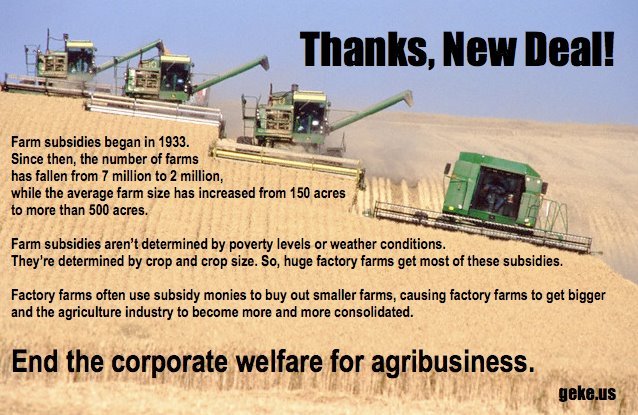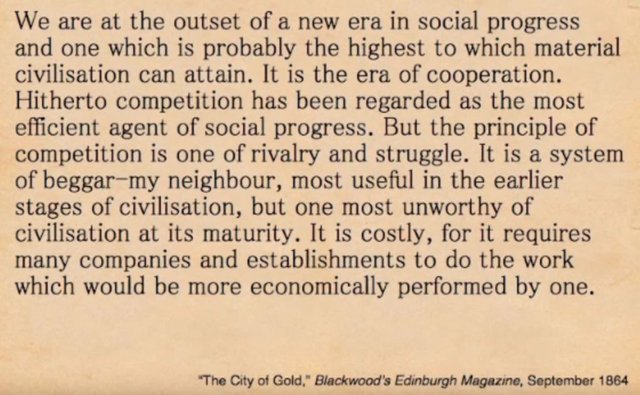FDR's New Deal & how it led to factory farming -- 1. The New Deal wasn't socialism

Last year I wrote a series of posts on Sustainability for Kids that I hope to someday compile into a longer, book-length collection. One of the posts talked about how New Deal policies helped create what we today call factory farms. But this topic deserves much more attention than one 800-word blog post and I've been meaning to return to this research to fully flesh it out. So let's do a little of that now.
The “factory farm” post (linked above) highlighted the fact that in an effort to raise agricultural prices, the Agricultural Adjustment Administration (part of FDR's New Deal) began paying farmers subsidies to not grow their crops. From the earlier post:

These payments were a form of government subsidy. Normally, a subsidy (according to the dictionary) is a “sum of money granted by the government to assist an industry or business so that the price of a commodity or service may remain low or competitive.” (emphasis added) In this case, though, the subsidy was for the opposite purpose: to keep the price of crops high.
The amount of these subsidies was primarily determined by the size of the crop. So the bigger the farm, the bigger the subsidy. You can already see that larger farms were effectively being encouraged by the government.
But the belief has always been that the trend toward bigger and bigger farms in the US -- eventually culminating in the corporate factory farm that's been crowding out the smaller family-run farm -- was an unintended consequence of bad government policies. Research, though, tells us otherwise. Let's look at the agricultural policies of the 1930s and the popular progressive theories that underlied those policies.
But before we do, we should stop to define a few terms. Critics of the New Deal at the time it was being implemented often described its policies as “socialist.” But anyone familiar with socialism will recognize that the New Deal wasn't socialist at all. Socialism involves government control of the economy's “means of production,” its resources. Companies in a socialist economy are owned by the government, and that was certainly not the case under the New Deal.
In fact, it's also a mistake to say that the New Deal was a movement toward socialism. It wasn't. Instead, the New Deal was chock full of policies that were known at the time as “progressive.”
Today when we think of progressive policies, it's largely the type of legislation promoted by the “New Democrats” who rallied around Bill and Hillary Clinton on issues like climate change or access to health care. But that's not what progressivism was about 100 years ago.
Back then, the progressives were focused on some very different and specific things: efficiency, integration, direct democracy, and eliminating what they saw as the biggest problem of all... competition. Using Google, you can find these positions described by progressives, themselves, as the movement was being formed in the late 1800s and early 1900s.
Progressives wanted to modernize (after all, their goal was progress) and improve the way business and society operated. In the late 1800s, they saw many existing business practices as inefficient and wasteful. Ultimately, progressives blamed these problems on the fact that businesses were forced to compete with one another. In their view, market competition caused many companies to waste financial resources that could be better used paying workers higher wages or investing in research toward more innovative products for society.
One of the very first expressions of “progressive” thinking was published in Blackwoods in 1864 and highlights the belief that the time had come to discourage competition:

Competition was seen as costly and inefficient and the concept of competition was the biggest complaint of the original progressives. Rex Tugwell, FDR's undersecretary of agriculture and the head of the New Deal's Agricultural Adjustment Administration, believed that the government should end “the anarchy of competition.” But though he was a progressive, ending competition wasn't his idea; he'd originally learned it from many progressives who had come before:
“Those who would seek to restore the days of unlimited and uncontrolled competition, and who believe that a panacea for our industrial and economic ills is to be found in the mere breaking up of all big corporations, simply because they are big, are attempting not only the impossible, but what, if possible, would be undesirable.”- Theodore Roosevelt, “The Trusts, the People, and the Square Deal”
“The mere absorption of facts and truths is so exclusively individual an affair that it tends very naturally to pass into selfishness. There is no obvious social motive for the acquirement of mere learning, there is no clear social gain in success thereat. Indeed, almost the only measure for success is a competitive one, in the bad sense of that term—a comparison of results in the recitation or in the examination to see which child has succeeded in getting ahead of others in storing up, in accumulating the maximum of information.”- John Dewey, “The School and Social Progress”
“[W]e have learned that unless there be regulation of competition, its excesses will lead to the destruction of competition, and monopoly will take its place.”- Louis Brandeis, “The Regulation of Competition Against the Regulation of Monopoly”
“The whole feminine attitude toward life differs essentially from the masculine... One the one hand, the principle of struggle, conflict, competition, the results of which make our 'economic problems.' On the other, the principle of growth, of culture, of applying service and nourishment in order to produce improvement.”- Charlotte Perkins Gilman, “His Religion and Hers”
“[T]he difference between competition and joint effort is a difference between a short and a long view. When we become enlightened enough to realize that we individually get more out of joining with people than by competing with them, we do it. For instance, formerly the local stores in a small town competed sharply with one another. Now, in some places they are beginning to join...”- Mary Parker Follett, _Creative Experience_
The New Deal wasn't socialist; it was progressive. It was a further move toward reducing competition. As Harold Cole, a professor of economics at UCLA wrote, “President Roosevelt believed that excessive competition was responsible for the Depression by reducing prices and wages, and by extension reducing employment and demand for goods and services.” And Roosevelt was successful, through many of his New Deal policies, at removing many forms of competition from the economy.
Next time, we'll look at those New Deal agricultural policies of the 1930s that caused the growth and incorporation of individual farms, as well as the progressive theories that encouraged this.


To listen to the audio version of this article click on the play image.

Brought to you by @tts. If you find it useful please consider upvoting this reply.
Hi @geke!
Your post was upvoted by @steem-ua, new Steem dApp, using UserAuthority for algorithmic post curation!
Your UA account score is currently 4.967 which ranks you at #1153 across all Steem accounts.
Your rank has not changed in the last three days.
In our last Algorithmic Curation Round, consisting of 182 contributions, your post is ranked at #142.
Evaluation of your UA score:
Feel free to join our @steem-ua Discord server
This is GREAT @ecotrain content @geke - noce to see you using the tag! And MORE PLEASE! Changing the way we farm and produce our food is pivotal to the environmental damage - and the healing of Mother Earth. WE are so all needing input on the new economics - fascinated to see you developed the homeschool economics curriculum for kids! You should check out @eco-alex too - a very cool guy to follow and also just so passionate about crypt, the environment and new structures and models for our global economy. This solo-mama is now following you from Thailand. :)
Leading the curation trail for both @ecotrain & @eco-alex.
Together We’re Making This World A Better Place.
Click Here To Join the manually curated trail "@artemislives" to support quality eco-green content.
@ecoTrain